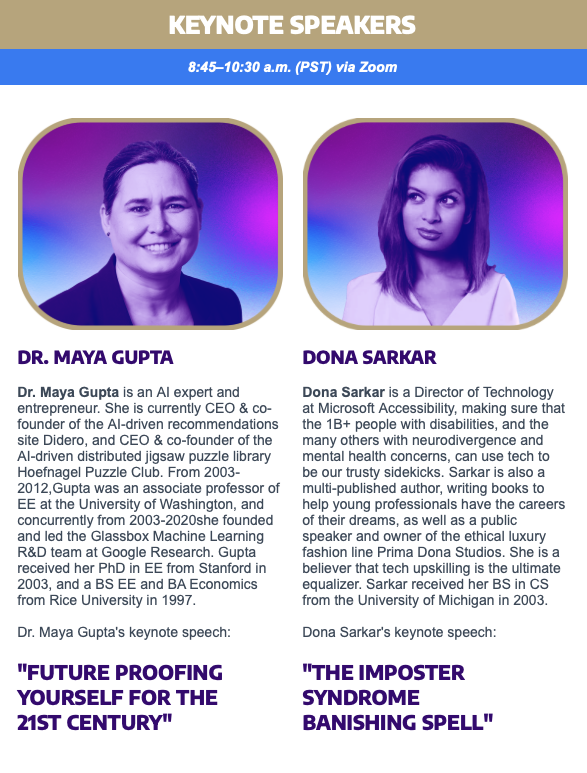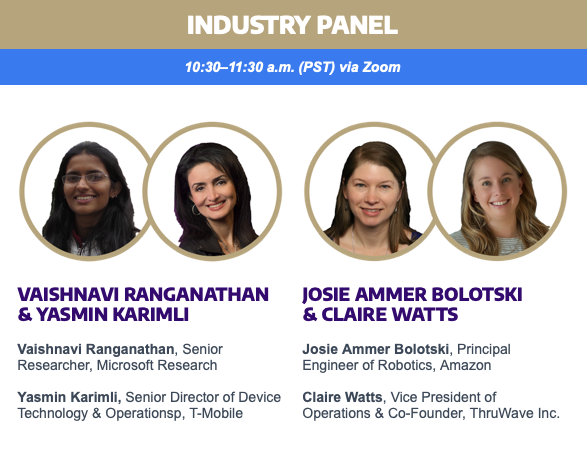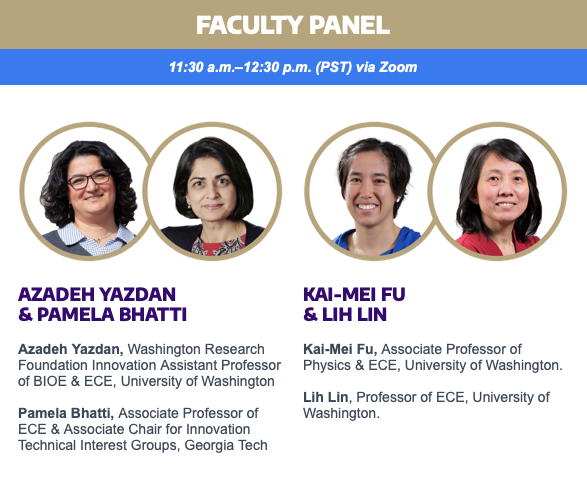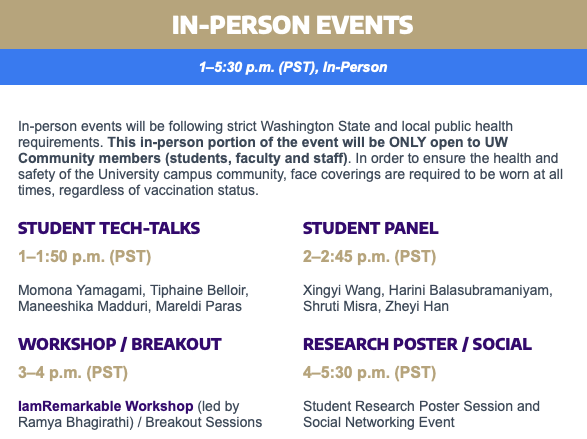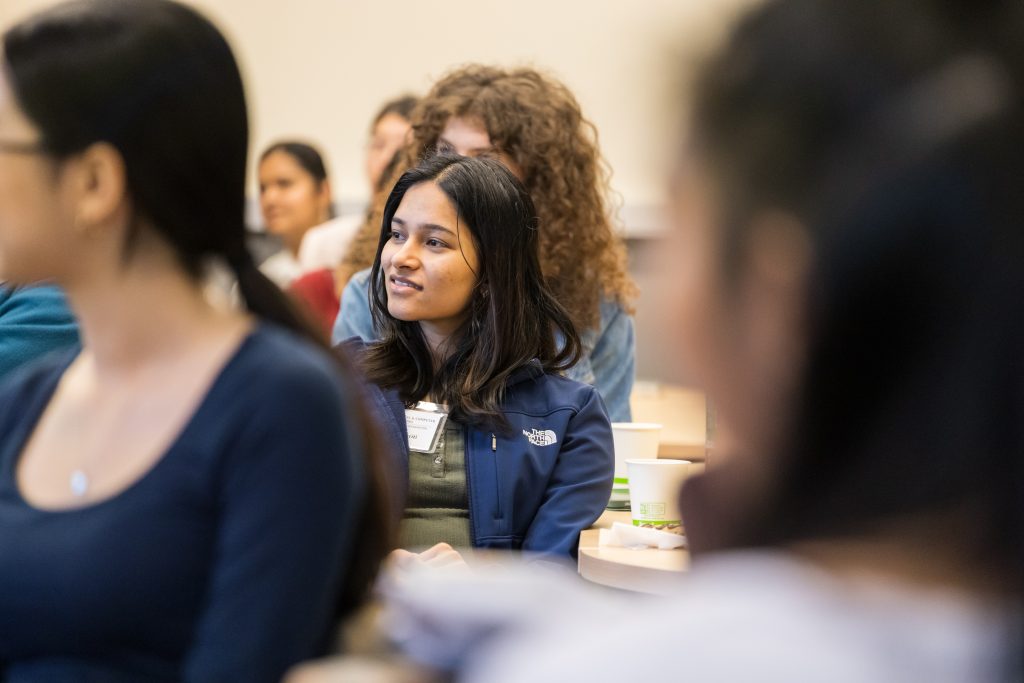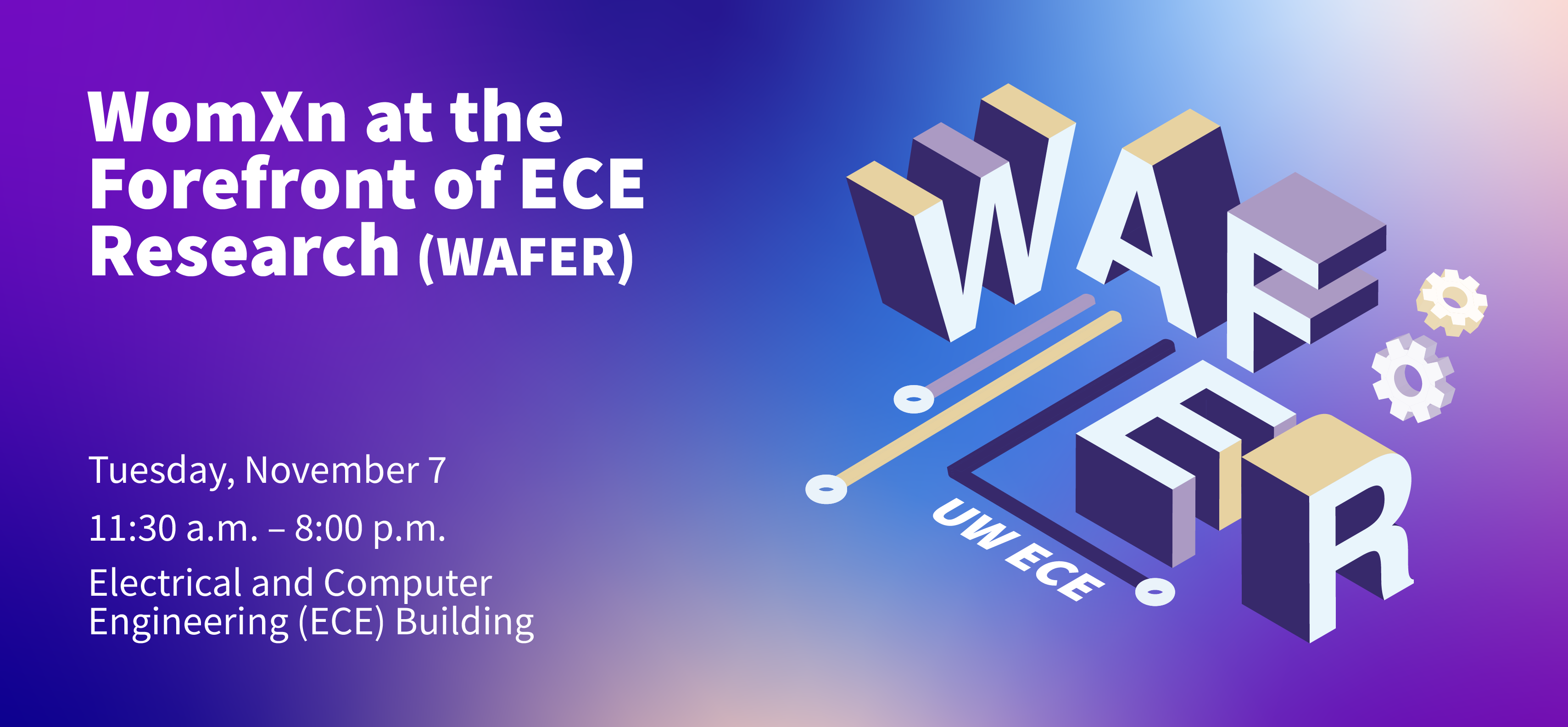WAFER 2025
April 10, 2025
WAFER 2025 Photo Gallery
The UW Department of Electrical & Computer Engineering (UW ECE) is excited to introduce the 3rd WomXn at the Forefront of Engineering Research (WAFER) event at the UW! This event aims to cultivate an inclusive environment for participants and speakers alike to share and learn more about research, hear others’ experiences in the field (at different stages of their careers), and to ultimately leave the event feeling inspired to potentially pursue a career in related fields. WAFER speakers include faculty, researchers, industry leaders, and students in ECE, CSE, and related fields.
WAFER encourages students who identify as women and/or non-binary to have an opportunity to showcase their research at the student poster session at the event. All students, faculty, researchers, and industry partners are welcome to attend this event.
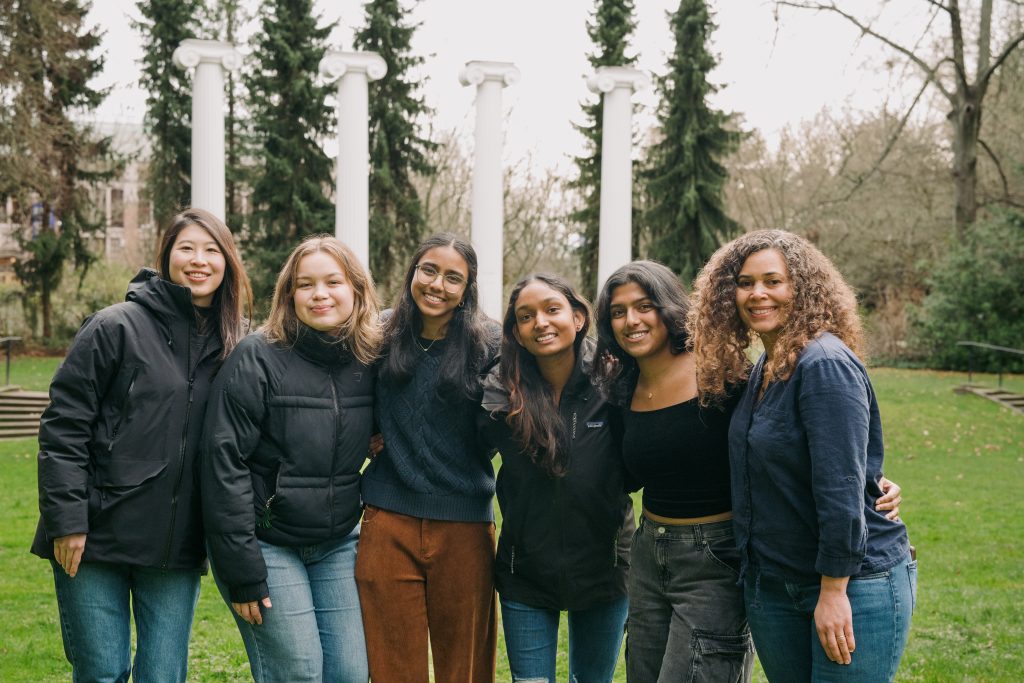
WAFER Club Officers from left to right: Amber Chou, Jazlin Taylor, Vibha Kumar, Dilini Nissanka, Shakti Senthil, Shanti Garman (Not shown: Caitlin Widjaja)
Agenda
|
Time |
Event |
Location |
|
11:45 a.m.–12 p.m. |
Check-in & Lunch |
CSE Atrium |
|
12–12:10 p.m. |
Welcome Remarks |
CSE Atrium |
|
12:10–1 p.m. |
Keynote Talks |
CSE Atrium |
|
1–1:50 p.m. |
Faculty Talks |
CSE Atrium |
|
1:50–2 p.m. |
Coffee Break |
EE 269 |
|
2–3 p.m. |
Career Panel |
EE 269 |
|
3–4 p.m. |
Networking |
EE 269 |
|
4–4:10 p.m. |
Coffee Break |
EE 269 |
|
4:10–5 p.m. |
Workshop: Fostering Cross-Cultural Communication |
EE 269 |
|
5–7 p.m. |
Student Posters & Reception |
CSE Atrium |
Welcome
Mari Ostendorf (System Design Methodologies Professor, UW ECE; Vice Provost for Research)
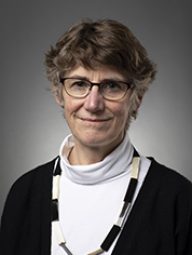
Keynote Speakers
12:10 – 12:35 p.m.
Ece Kamar (Managing Director of the AI Frontiers Lab, Microsoft Research)
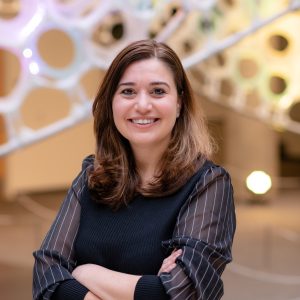
Ece Kamar is the Managing Director of AI Frontiers, leading research and development towards pushing the frontiers of AI capabilities. AI Frontiers is a non-geographical, mission-focused lab inside Microsoft Research that explores innovations in foundation models and platform capabilities to push the frontier of AI capabilities, efficiency and control.
Ece’s personal research focuses on developing AI systems that can function reliably in the open world in collaboration with people. She has a decade of experience studying the impact of AI on society and developing AI systems that are reliable, unbiased and trustworthy. She has been instrumental in building the Responsible AI efforts inside Microsoft. She serves as Technical Adviser for Microsoft’s Internal Committee on AI, Engineering and Ethics.
Ece is also an affiliate faculty at the University of Washington.
12:35 – 1 p.m.
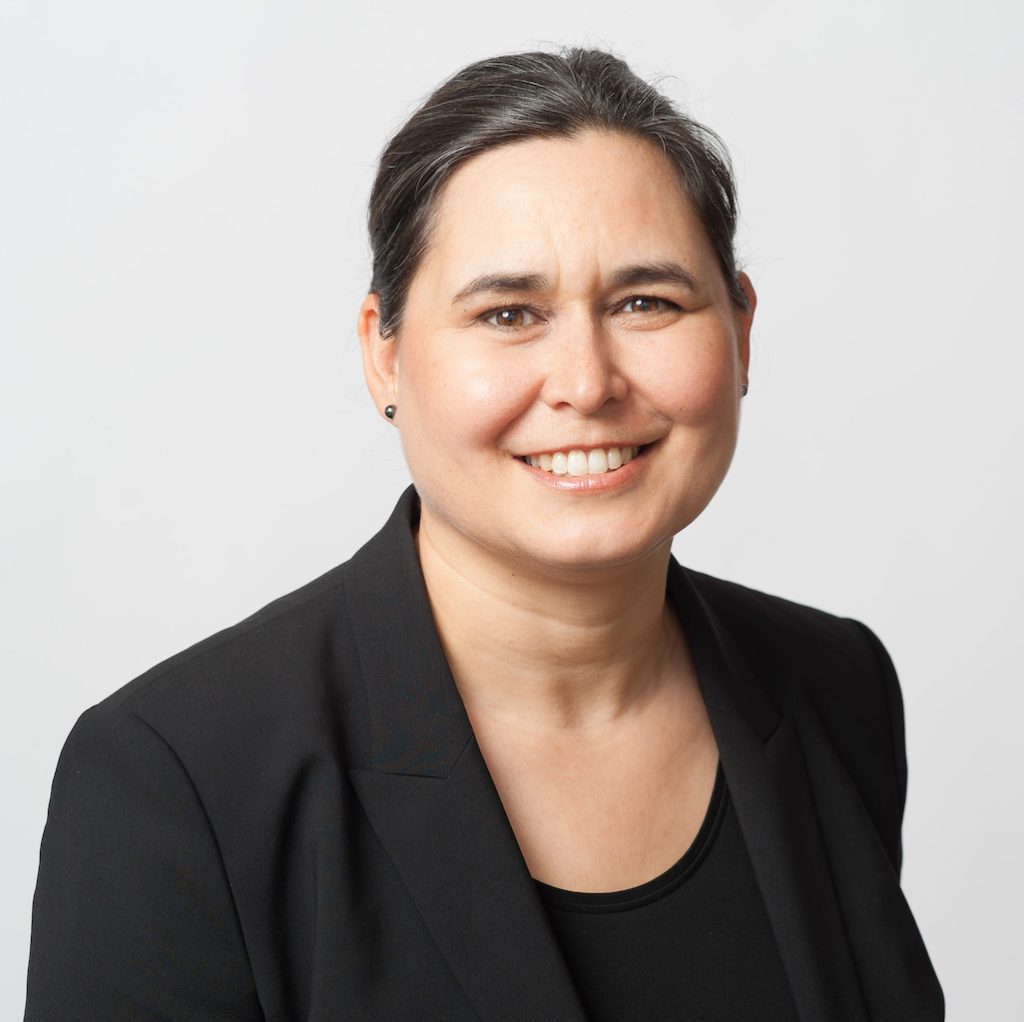
Talk title: It Takes A Network
Maya Gupta is a tech entrepreneur and AI researcher. She’s started seven companies, of which four have been profitable, and is working on a book on managing creativity. She led research teams at Google Research and the UW, and worked in R&D at Ricoh, Hewlett Packard, AT&T Labs, and NATO. Gupta has a PhD in EE from Stanford, and a BS EE and BA Econ from Rice.
Moderator
Maryam Fazel (Moorthy Family Inspiration Career Development Professor, UW ECE; CSE)
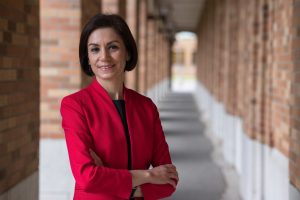
Maryam Fazel is the Moorthy Family Professor of Electrical and Computer Engineering at the University of Washington, with adjunct appointments in Computer Science and Engineering, Mathematics, and Statistics. Maryam received her MS and PhD from Stanford University, her BS from Sharif University of Technology in Iran, and was a postdoctoral scholar at Caltech before joining UW. She is a recipient of the NSF Career Award, UWEE Outstanding Teaching Award, a UAI conference Best Student Paper Award with her student. She directs the Institute for Foundations of Data Science (IFDS), a multi-site NSF TRIPODS Institute. She serves on the Editorial board of the MOS-SIAM Book Series on Optimization, and as an Acting Editor of the Journal of Machine Learning Research. Her current research interests are in the area of optimization in machine learning and control.
Faculty Talks
Jungwon Choi (Assistant Professor, UW ECE)
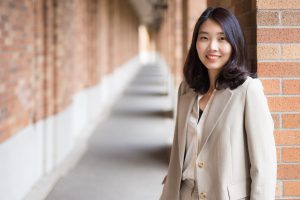
Jungwon Choi is an Assistant Professor in the Electrical and Computer Engineering department at the University of Washington. She received her Ph.D. degree in Electrical Engineering at Stanford University in 2019, M.S. in Electrical Engineering and Computer Science from the University of Michigan, Ann Arbor, in 2013, and B.S. in Electrical Engineering from Korea University in Seoul, Korea, in 2009. Her research interests include high-frequency power converters, wireless power transfer for battery-powered vehicles, industrial and biomedical applications, magnetic designs, controls at high-frequencies, energy storage, and wide bandgap devices. In 2017, she was selected to the Rising Stars in EECS, received Unlock Idea awards from Lam Research in 2019 and 2020, and the National Science Foundation (NSF) CAREER award in 2021. She is an Associate Editor of the IEEE Journal of Emerging and Selected Topics in Industrial Electronics. Also, she is an Organizing Committee and Vice Chair of the IEEE Energy Conversion & Expo (ECCE) 2023, Technical Program Committee, and Organizing Committee of the IEEE Workshop on Control and Modeling for Power Electronics (COMPEL) 2023 and 2024, respectively.
Natasha Jaques (Assistant Professor, Allen School)
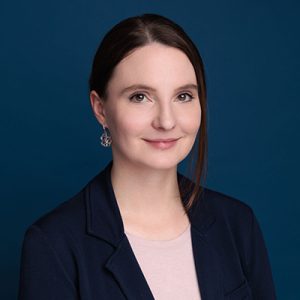
Natasha Jaques is an Assistant Professor of Computer Science and Engineering at the University of Washington, and a Senior Research Scientist at Google DeepMind. Her research focuses on Social Reinforcement Learning in multi-agent and human-AI interactions. During her PhD at MIT, she developed foundational techniques for training language models with Reinforcement Learning from Human Feedback (RLHF). In the multi-agent space, she has developed techniques for improving coordination through social influence, and unsupervised environment design. Natasha’s work has received various awards, including Best Demo at NeurIPS, an honourable mention for Best Paper at ICML, and the Outstanding PhD Dissertation Award from the Association for the Advancement of Affective Computing. Her work has been featured in Science Magazine, MIT Technology Review, Quartz, IEEE Spectrum, Boston Magazine, and on CBC radio, among others. Natasha earned her Masters degree from the University of British Columbia, undergraduate degrees in Computer Science and Psychology from the University of Regina, and was a postdoctoral fellow at UC Berkeley.
Yiyue Luo (Assistant Professor, UW ECE)
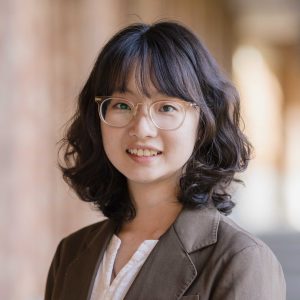
Yiyue Luo received her Ph.D. degree in EECS from MIT in 2024 and a B.S. degree in Materials Science & Engineering from UIUC in 2017. Her research lies at the intersection of digital fabrication, human-computer/robot interaction, and applied AI. Her research on integrated intelligent textiles has been published in interdisciplinary journals, e.g., Nature Electronics and Nature Communications, top human-computer interactions, robotics and learning venues, e.g., CHI, UIST, CVPR, ICRA. Her work has been featured in prominent media outlets and invited to public museums and world congress exhibitions. She has been supported by fellowship from MathWorks, Google, and Accenture, and was listed as 30 under 30 North American 2024.
Amy Orsborn (Clare Boothe Luce Assistant Professor, UW ECE)
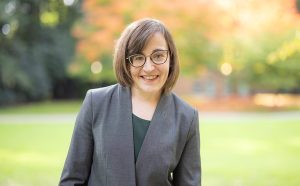
Amy Orsborn is a Clare Boothe Luce Assistant Professor in the departments of Electrical & Computer Engineering and Bioengineering at the University of Washington. Her research explores sensorimotor learningin brain-computer interfaces and how learning is influenced by the algorithms used. She completed her Ph.D. at the UC Berkeley/UCSF Joint Graduate Program in Bioengineering and her postdoctoral training at NYU’s Center for Neural Science. She recently received the NSF CAREER award, a Sloan Foundation Research Fellowship, and was named an Emerging Leader by the American Institute of Medical and Biological Engineering. Her research has been supported by a range of federal (NSF, NIH) and private (Simons Foundation) agencies, along with industry (Google, Meta).
Moderator
Sam Burden (Associate Professor, UW ECE)
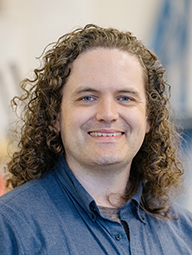
Sam Burden earned his BS with Honors in Electrical Engineering from the University of Washington in Seattle in 2008. He earned his PhD in Electrical Engineering and Computer Sciences from the University of California in Berkeley in 2014, where he subsequently spent one year as a Postdoctoral Scholar. In 2015, he returned to UW EE (now ECE) as an Assistant Professor, where he received awards for research (Young Investigator Program, Army Research Office, 2016; CAREER, National Science Foundation, M3X program, 2021) and service (Junior Faculty Award, UW College of Engineering, 2021). Sam served as his Department’s Associate Chair for Diversity, Equity, and Inclusion in 2021–2022 and 2024–2025 and was promoted to Associate Professor with tenure in 2022. He is broadly interested in discovering and formalizing principles of sensorimotor control. Specifically, he focuses on applications in robotics, neuroengineering, and (human-)cyber-physical systems. Sam lives with chronic illness, and is happy to meet with anyone who identifies as disabled or chronically ill.
Career Panel
Bryna Hazelton (eScience Director of Research Programs; Senior Research Scientist)
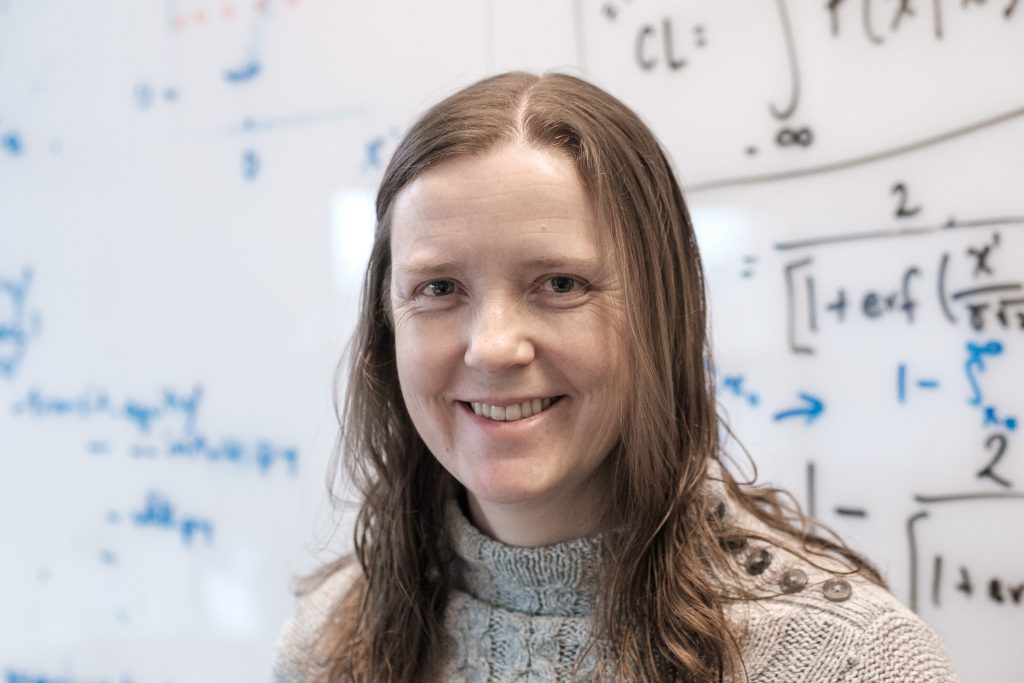
Bryna Hazelton is a Senior Research Scientist in the Physics Department and the eScience Institute. Bryna’s primary research is in astrophysics and cosmology — she helps design and build radio telescopes to detect signatures of the first stars and galaxies forming 13 billion years ago. She is an expert in the statistical analysis of peta-byte scale data from these telescopes, trying to detect an incredibly faint signal from the early universe in the face of very bright foreground galaxies and subtle instrumental systematics.
Bryna is the eScience Director of Research Programs and through eScience has collaborated on a diverse set of projects ranging from social work to ocean meta-genomics, helping with challenges ranging from collaborating efficiently with git to wrangling SQL databases to rigorous statistical analyses. Bryna loves learning about the challenges in new fields and helping researchers overcome hurdles in research computing.
Bryna has a B.S in Physics from UC San Diego and an MS and PhD in Physics from UC Santa Cruz, where she used satellite, airborne and ground-based instruments to study x-ray and gamma-ray emissions from thunderstorms. She switched to radio cosmology for her postdoc at UW and joined the eScience Institute in 2015. She is the lead developer and maintainer of several widely used astronomical and cosmological open source packages.
Kiana Ehsani (Co-founder, Vercept)
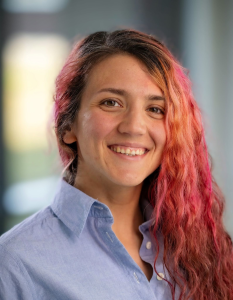
Kiana Ehsani is an entrepreneur and computer scientist specializing in computer vision, machine learning, and artificial intelligence. She earned her Ph.D. from the Paul G. Allen School of Computer Science & Engineering at the University of Washington, where her research explored visual perception and interactive AI systems. Previously, Kiana served as a Senior Research Scientist at the Allen Institute for Artificial Intelligence (AI2), leading projects in embodied AI and multimodal learning. Her influential research has been published in leading AI conferences, earning multiple prestigious awards, including Best Paper awards at NeurIPS, CoRL, IROS and ICRA. Currently, Kiana is co-founder and CEO of Vercept, a stealth-mode startup focused on groundbreaking advancements in artificial intelligence.
Cassie Meeker (Sr. Applied Scientist, Amazon Robotics)
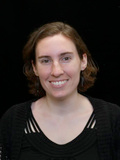
Cassie Meeker is a Sr. Applied Scientist at Amazon Robotics, specializing in computer vision. She currently develops computer vision models for unboxed item storage and manipulation. Previously at Amazon, Meeker worked on package manipulation, leading her team’s efforts to scale perception models from 5 sites to over 200 sites. Prior to Amazon, Meeker earned her doctoral degree from Columbia University in Mechanical Engineering, where she developed control algorithms for rehabilitation robotics and non-anthropomorphic teleoperation robotic hands.
Shirley Yeung (Sr. Engineering Manager, Stryker)
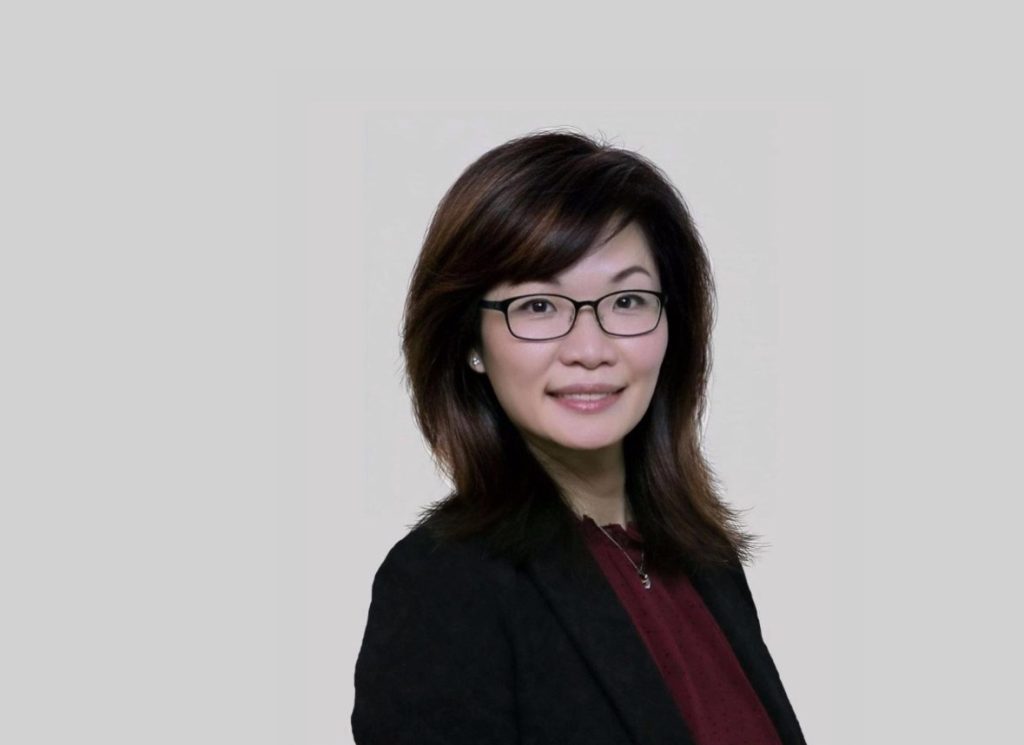
Senior engineering manager with extensive experience in embedded systems, GUI/application software, product/software-level design verification, test automation, and test system development for the Class III medical industry. A leader with an excellent record of building high-performance and collaborative teams with focus on diversity and talent development. Passionate about building a high-quality organization with an engaging cross-functional team culture.
Julia Busono (Platform Development Lead, Microsoft)
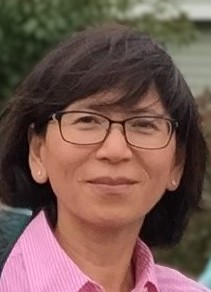
Julia Busono Platform Development Lead for Surface devices at Microsoft, working with EE and ME development partners to design and manufacture Laptops and Tablets showcasing Windows, for both Commercial and Consumer markets. Prior experience was mostly in board designs – in medical devices (Spacelabs, Dolphin, OSI), wireless (AT&T Wireless), aerospace (Honeywell), and consumer electronics industries. A slight detour into Patent Law happened, followed by a return to the Electrical Engineering field.
Moderator
Shanti Garman (Ph.D. student and Professional Master’s Program instructor, UW ECE)
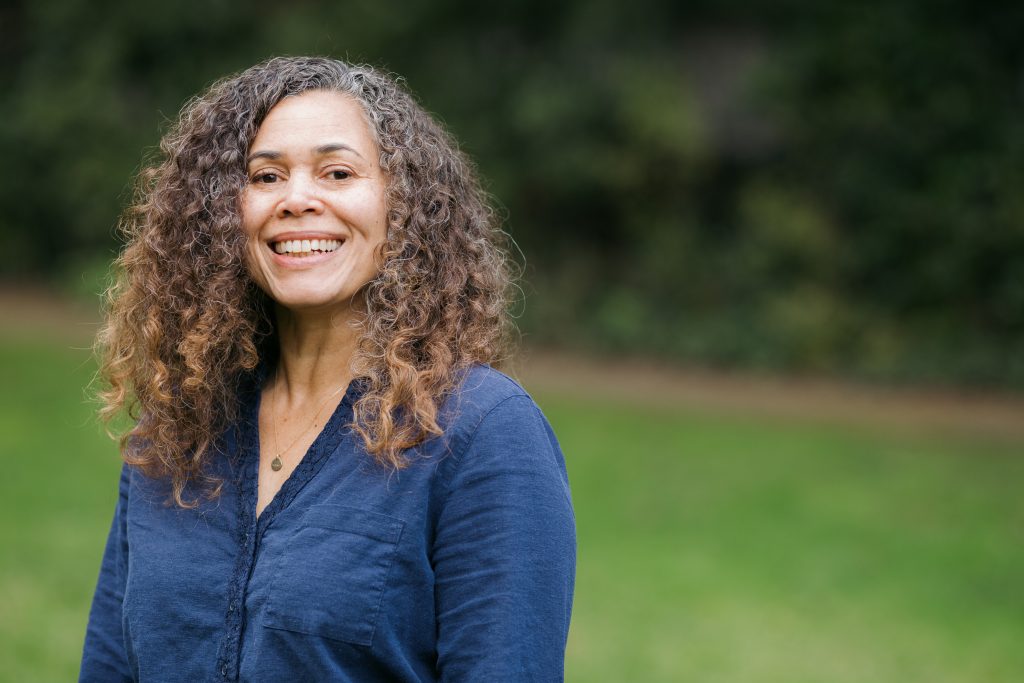
Shanti Garman is a Doctoral Candidate in the Department of Electrical & Computer Engineering at the University of Washington where she works with the Sensor Systems Lab (PI: Joshua R. Smith) on wireless power transfer for Lunar and planetary missions, RF energy harvesting from high-power sources on Earth, and emerging low-power communication schemes, such as Modulated Noise Communication. Shanti has a strong interest in applied electromagnetics and antennas, and previously taught the UW ECE Antennas course to UW Professional Master’s students. Before UW, Shanti completed her BSEE and MSEE at Stanford, launched satellites with Space Systems/Loral, earned an MBA, and continued launching services and programs for for-profit (Microsoft) and nonprofit (Rainier Scholars) institutions. As a first-generation college student and minority woman in STEM, Shanti has first-hand experience navigating institutional obstacles related to race and gender, and as such she dedicates time throughout the academic year to support departmental Diversity, Equity, and Inclusion (DEI) efforts. At UW, this has included serving on the department’s DEI committee and co-chairing the first two WAFER conferences at UW.
Workshop
Fostering Cross-Cultural Communication, Professor Renee Desing
Renee Desing (Assistant Teaching Professor, UW ME)
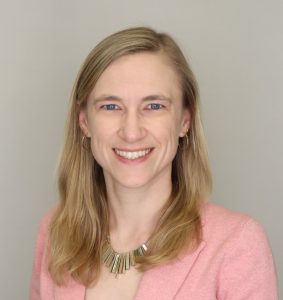
Renee Desing is an assistant teaching professor in the Department of Mechanical Engineering at the University of Washington. Her research interests include diversity, equity, and inclusion in the engineering classrooms and workplaces. Dr. Desing graduated from The Ohio State University with her Ph.D. in Engineering Education, and also holds a B.S. in Industrial Engineering from the Georgia Institute of Technology and a M.S. in Industrial Engineering and Operations Research from the Pennsylvania State University.
Networking participants
Vaishnavi Ranganathan (Principal Researcher in the Networking Research Group at Microsoft Research (MSR))
Leigh Huang (Senior Director, Microsoft Devices)
Claire Watts (co-founder and VP Operations at ThruWave)
WAFER 2023
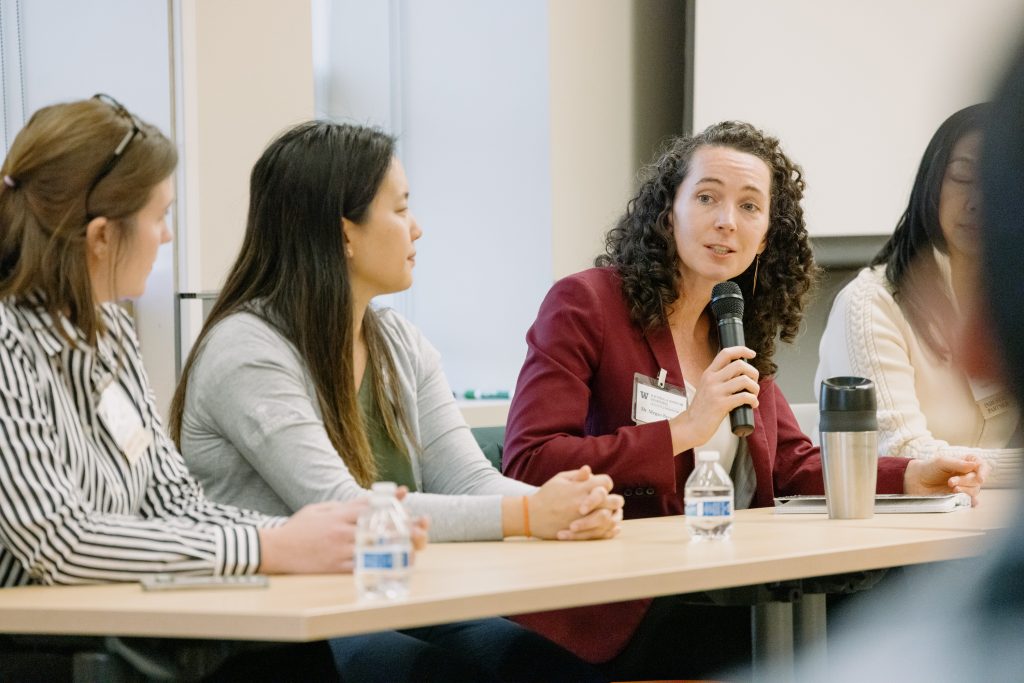 Check out photos from the event!
Check out photos from the event!
WomXn at the Forefront of ECE Research (WAFER)
Tuesday, November 7, 2023
Agenda March 9
Time (PT) |
Event |
Location |
| 11:30 a.m. | WAFER Check In | CSE Atrium |
| 12 p.m. | Welcome Remarks | CSE Atrium |
| 12:10 p.m. | Keynote Talks | CSE Atrium |
| 1 p.m. | Break | |
| 1:10 p.m. | Faculty Panel | ECE 269 |
| 2 p.m. | Industry Panel | ECE 269 |
| 2:50 p.m. | Coffee Break | ECE 269 |
| 3 p.m. | Workshop on Sex, Gender & Engineering | ECE 269 |
| 4 p.m. | Student Tech Talks | ECE 269 |
| 5 p.m. | Coffee Break | ECE 269 |
| 5:10 p.m. | Student Panel | ECE 269 |
| 6 p.m. | Break | |
| 6:10 p.m. | Closing Remarks | CSE Atrium |
| 6:15 – 8 p.m. | Dinner + Poster Session | CSE Atrium |
Keynote Speakers
12:10 – 1 p.m. in the CSE Atrium
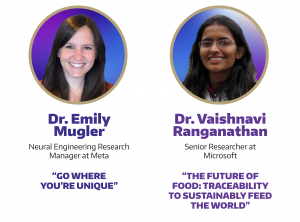
Moderator: Azadeh Yazdan, Washington Research Foundation Innovation Associate Professor, University of Washington
Dr. Emily Mugler is a tech lead in the Reality Labs Research division at Meta, driving research in neural engineering. She is a proud graduate of Duke University in biomedical engineering and neuroscience and served as a Fulbright scholar to Germany in 2007 to study brain-computer interface with people with ALS. For her doctoral dissertation at the University of Illinois at Chicago, she decoded speech activity from cortical signals during awake brain surgeries, and continued this work as part of her post-doc at Northwestern University, where she also leveraged real-time electromyographic signals to help rehabilitate stroke survivors. Dr. Mugler has been at Meta for over 6 years and was recently inducted into her high school’s Distinguished Hall of Fame for her work in the field of brain-computer interface. She is a proud mom of 2 and currently resides in Seattle.
Vaishnavi Ranganathan is a Senior Researcher at Microsoft with the Networking Research Group. Vaishnavi’s research interest lies in applications that can help with sustainability, environment and health. At Microsoft Research, her current research focuses on bringing traceability and optimization to the Food Supply Chain to reduce food loss and sustainably meet the global food and nutrition demand. Vaishnavi graduated with her PhD from the Sensor Systems Lab in the ECE department at UW in 2018. Her Graduate research focus was wireless biomedical sensing with a focus on neural implants. Outside of Research, Vaishnavi is a collector of fun hobbies.
ECE Faculty Panelists
1:10 – 2 p.m. at ECE 269
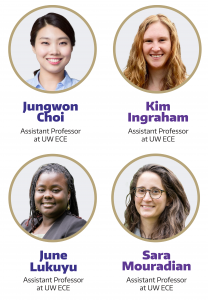
Moderator: Amy Orsborn, Clare Boothe Luce Assistant Professor, University of Washington
Jungwon Choi is an Assistant Professor in the Electrical and Computer Engineering department at the University of Minnesota, Twin Cities. She received her Ph.D. degree in Electrical Engineering at Stanford University in 2019, M.S. in Electrical Engineering and Computer Science from the University of Michigan, Ann Arbor, in 2013, and B.S. in Electrical Engineering from Korea University in Seoul, Korea, in 2009. Her research interests include high-frequency power converters, wireless power transfer for battery-powered vehicles, industrial and biomedical applications, magnetic designs, controls at high-frequencies, energy storage, and wide bandgap devices. In 2017, she was selected to the Rising Stars in EECS, received Unlock Idea awards from Lam Research in 2019 and 2020, and National Science Foundation (NSF) CAREER award in 2021. She is an Associate Editor of the IEEE Journal of Emerging and Selected Topics in Industrial Electronics. Also, she is an Organizing Committee and Vice Chair of the IEEE Energy Conversion & Expo (ECCE) 2023, Technical Program Committee, and Organizing Committee of the IEEE Workshop on Control and Modeling for Power Electronics (COMPEL) 2023 and 2024, respectively.
Prof. Kim Ingraham (she/her) is an Assistant Professor of Electrical & Computer Engineering and an Adjunct Assistant Professor of Mechanical Engineering at UW. She is affiliated with UW CREATE (Center for Research and Education on Accessible Technology and Experiences) and is a core faculty member of the AMP Lab. Prof. Ingraham directs the (yet-to-be-named) Ingraham Lab, focused on advancing human mobility using assistive robotic devices, such as exoskeletons, prostheses, and powered wheelchairs.
Prof. Ingraham has an interdisciplinary training background, and has earned degrees in Biomedical Engineering (BE 2012, Vanderbilt University) and Mechanical Engineering (MS, PhD 2021, University of Michigan). She was a CREATE postdoctoral fellow in Rehabilitation Medicine at the University of Washington. Prior to beginning graduate school, she worked as a Research Engineer at the Shirley Ryan AbilityLab (formerly the Rehabilitation Institute of Chicago).
In her past professional and doctoral research, Prof. Ingraham has developed and evaluated physiologically-inspired control systems for a variety of assistive devices, including powered lower-limb prostheses, robotic exoskeletons, and powered wheelchairs for young children with disabilities. Prof. Ingraham was an NSF graduate research fellow, and received Honorable Mention for the 2021 Richard and Eleanor Towner Prize for Outstanding Ph.D. Research at the University of Michigan.
June Lukuyu is an Assistant Professor of Electrical and Computer Engineering affiliated with the UW Clean Energy Institute. She is also a fellow of the Energy for Growth Hub. She directs the Interdisciplinary Energy Analytics for Society (IDEAS) Research Group, which focuses on developing and planning sustainable, inclusive, and integrated energy systems and technologies for underserved communities, centering on promoting social development and human empowerment. She earned her Ph.D. in Electrical and Computer Engineering from the University of Massachusetts, Amherst. Prior to that, she earned her MSc. in Renewable Energy Systems Technologies from Loughborough University and her BS in Engineering Science from Smith College.
She employs a multi-disciplinary approach, incorporating data analytics, computational techniques, energy system modeling, and social science methods to develop comprehensive models for integrated community energy development and planning. Lukuyu’s research emphasizes the importance of meaningful community engagement and participation in the planning process, recognizing that sustainable and inclusive energy solutions are most effective when developed collaboratively and with the active involvement of the communities they serve.
Sara Mouradian is an Assistant Professor of Electrical and Computer Engineering at the University of Washington, Seattle. She received her B.S., M.Eng., and Ph.D. degrees from the Massachusetts Institute of Technology where she worked on quantum technologies in optical and solid-state systems. She was then an Intelligence Community Postdoctoral Fellow at the University of California, Berkeley where she helped to demonstrate control over rotational modes of ions and demonstrated a new sensing technique capable of showing real quantum advantage. At UW her lab focuses on trapped ion quantum information processing including optical control with integrated photonics, optimization of multi-qubit gates, and fabrication of next generation trap designs. In addition to her research work, she is passionate about educating students of all ages and backgrounds about science in general and quantum technologies in particular.
Industry Panelists
2 – 2:50 p.m. at ECE 269
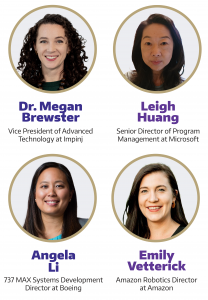
Moderator: Maryam Fazel, Moorthy Family Inspiration Career Development Professor, University of Washington
Dr. Megan Brewster is a technologist and policy entrepreneur who has worked at the forefront of innovation over the last 15 years. She is currently the vice president of advanced technology at Impinj. In this role, she brings clarity and strategy to the Impinj technology roadmap and fosters growth in emerging RAIN RFID opportunities to deliver the Internet of Every Thing. Prior to Impinj, Megan supported the co-creation of future mobility solutions by crowdsourcing transportation product designs and rapidly prototyping the ideas by direct digital manufacturing methods. She led the White House Office of Science and Technology Policy’s advanced manufacturing and semiconductor portfolios. At GE Global Research, she investigated performance degradation mechanisms and developed next-generation chemistries for sodium metal halide batteries. Megan earned a Ph.D. in materials science and engineering from MIT with a minor in technology and public policy and a bachelor’s degree from the University of Washington.
Leigh Huang
Although I wasn’t born in the Pacific NW, I consider myself a native of this area as I used to commute from the East Side to UW, driving past the Microsoft building when it was still located next to MasterBurger on SR520. I received dual bachelor degrees from UW: EE and Computer Science. My master’s degree was in EE from MIT focusing on VLSI design (does that term still exist today?) and computer graphics.I started my professional career in the San Francisco Bay Area as a software engineer in the electronic design automation field. Transitioned my role from a developer into product management, sales operations, and business. Like many folks in the Bay Area, I was bit by the entrepreneurial bug and started my own start-up with another partner. I learned the ropes on putting writing business plan, putting together a team, and raising venture capital funding. Unfortunately timing was bad. I joined Microsoft after wrapping up my start-up in 2003. I’m currently a Senior Director of Program Management in the Surface organization. I am responsible for the software and firmware delivered on Surface products such as the Surface Pro, Surface Laptop, Surface Laptop Studio, etc. I’m looking forward to sharing my experiences of learning and growing as a Computer Science and Electrical Engineer graduate from UW.
Angela Li is the Director of 737 MAX Systems Development at the Boeing Company. Named to this role in July 2021, she is responsible for the technical integration, certification, and safety activities for Airplane Systems on the 737-7 and 737-10 airplanes.
Prior to her current role, Angela held several engineering and leadership roles on the 737 program as well as in the Electronic Systems Design Center. She served as the 737 MAX Development Systems Integration Senior Manager, Airplane Systems Engineering Integration Team (SEIT) Leader for the Boeing Flight Management System (BFMS), as well as Avionics senior leader for 747, VC-25B, 767, KC-46, and 787 programs.
Angela is a graduate of the University of Washington in Seattle, Washington where she received her B.S. and M.S. in Electrical Engineering. She also serves as the Boeing Executive Focal for the University of Washington Electrical and Computer Engineering Department and is a member of their Advisory Board.
In her spare time, Angela enjoys traveling, exploring new restaurants, playing competitive tennis, and is currently making a solid attempt to pick up golf.
Emily Vetterick
As a director in Amazon Robotics, Emily is responsible for innovating new automation solutions and delivering at scale for our customers. Her team supports many products, including Bi-Pedal robotic solutions and custom manipulation products. Throughout her career, Emily has led development of many complex systems throughout all phases of the life cycle including requirement development, conceptual design, verification and validation, and scaled production. She worked in aerospace for ten years on commercial, defense, and space products and served as the Product, Program and Tech leader while at Amazon’s Prime Air. Emily enjoys exploring Seattle with her husband and two children.
Student Tech Talks
4 – 5 p.m. at ECE 269
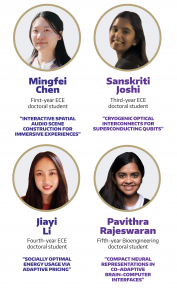
Student Panelists
5:10 – 6 p.m. at ECE 269
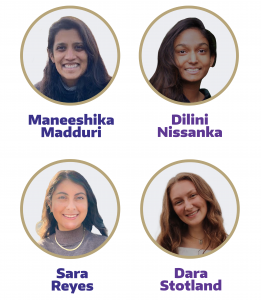
Moderator: Weijia Shi
I am a PhD student in Computer Science at the University of Washington advised by Prof. Luke Zettlemoyer and Prof. Noah A. Smith. I have been a visiting research at Meta AI. Prior to UW, I graduated from UCLA with a B.S. in Computer Science and Minor in Math.
Maneeshika is a PhD student in the ECE department, working with Professors Orsborn and Burden. Her research focuses on co-adaptive neural interfaces. Prior to her PhD, Maneeshika worked as an electrical engineer at a neurotech startup called Cala Health and at Sandia National Labs. Maneeshika also has interests in the venture space in Seattle and worked part-time as a venture analyst with Washington Research Foundation.
Dilini is a second-year undergraduate student studying Computer Science at UW. She is working in the SSOL lab under the guidance of Professor Vikram Iyer. Her current research includes collaborating with PhD student, Shirley Xue, to develop a smart earring and surveying LLMs for embedded systems development with PhD student Zachary Englhardt. Dilini’s research interests are in areas of ubiquitous computing and sensor systems to tackle problems in healthcare and environmental science. Beyond research, Dilini is passionate about K-12 outreach as the Outreach Head for Women in Computing (WiC) and increasing diversity in research.
Sara is a 1st year Ph.D student in ECE interested in backscatter communication systems working under Matt Reynolds. Her current work is on using existing digital I/O pins on FPGA’s to enable backscatter communication. She’s interested in advancing the communications field while also working with organizations all over campus to promote equity and representation in engineering through mentoring and teaching STEM courses to underrepresented minorities at the K-12 level. Sara wants to help pave the way for other students from underrepresented backgrounds interested in STEM careers, providing representation and pathways to success for them.
I’m Dara Stotland and I am currently an undergrad BS/MS Computer Science student in my fourth year at UW. I am performing research with the Sensor Systems Lab on low-power communication systems, with a focus on Modulated Noise Communication and backscatter technology. I am also currently a Teaching Assistant for CSE 451 (Intro to Operating Systems). I am passionate about helping others and empowering the community through technology and public education, as well as looking for ways to build my curiosity in embedded systems, RF technology, and low-level programming.
WAFER 2021
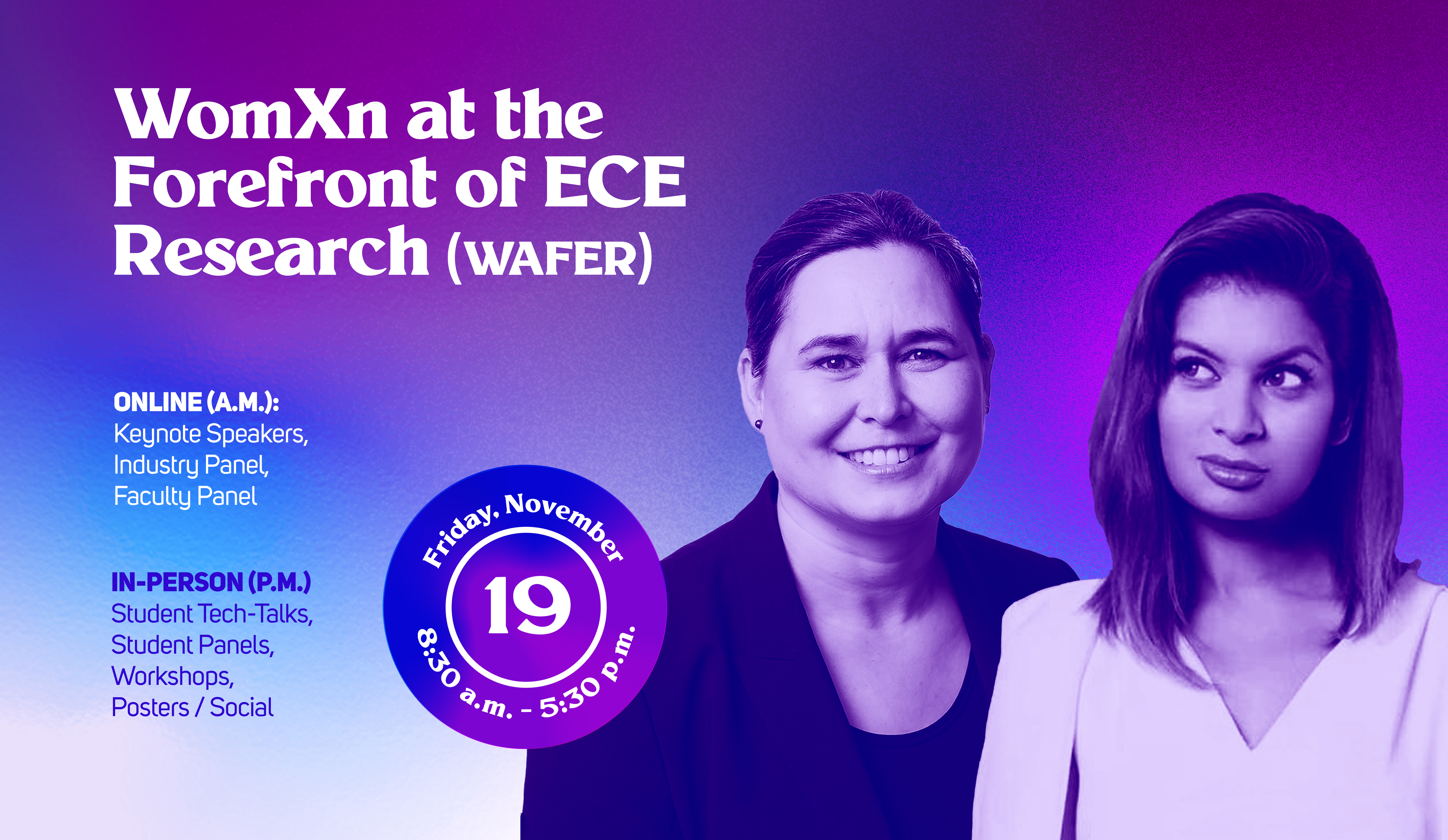 The all-day event is free and will take place online (open to everyone) and in-person (UW community only). Join us online via Zoom from 8:30 a.m.–12:30 p.m. (PST) to hear keynote speakers, Dr. Maya Gupta(CEO & Founder at Didero) and Dona Sarkar(Director of Technology at Microsoft Accessibility). Following the keynote presentations there will be an Industry Panel and Faculty Panel (see below for details). The event will then shift to in-person activities (UW community members only) from 1– 5:30 p.m. (PST) and will include Student Tech-Talks, a Student Panel, Workshops and a Research Poster Social. Registration is required to secure your spot. Click below to learn more!
The all-day event is free and will take place online (open to everyone) and in-person (UW community only). Join us online via Zoom from 8:30 a.m.–12:30 p.m. (PST) to hear keynote speakers, Dr. Maya Gupta(CEO & Founder at Didero) and Dona Sarkar(Director of Technology at Microsoft Accessibility). Following the keynote presentations there will be an Industry Panel and Faculty Panel (see below for details). The event will then shift to in-person activities (UW community members only) from 1– 5:30 p.m. (PST) and will include Student Tech-Talks, a Student Panel, Workshops and a Research Poster Social. Registration is required to secure your spot. Click below to learn more!
